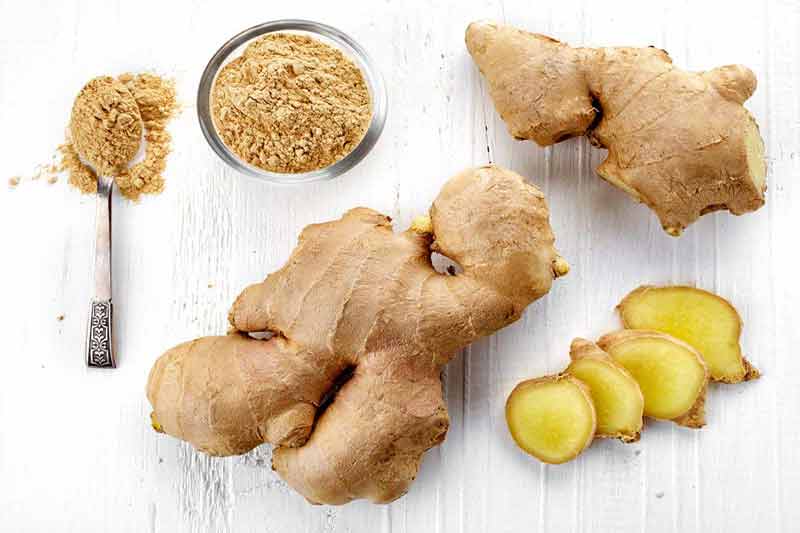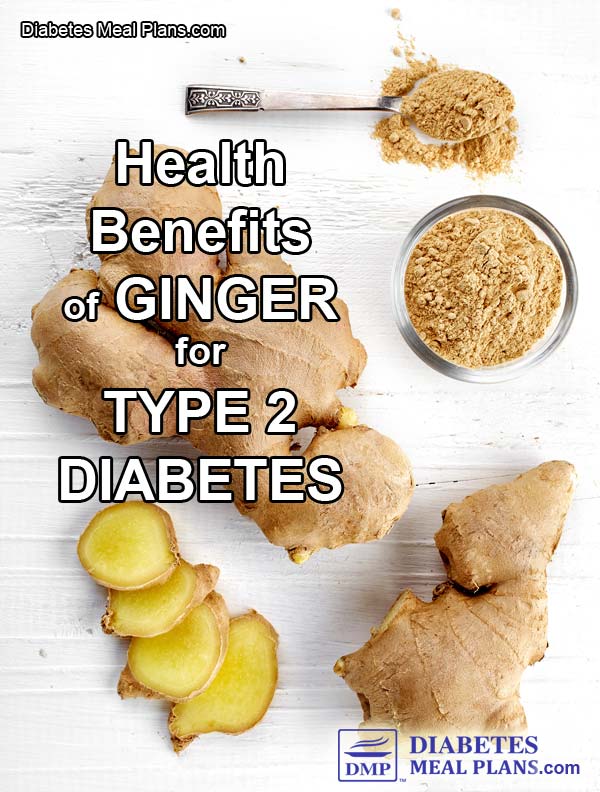When people think about ginger, they often think of classics such as a glass of ginger ale or a fresh gingerbread cookie. But ginger is actually a fibrous root, that’s typically pale yellow in color and has been around for thousands of years.
The root resembles an asymmetrical knot, and can be eaten raw, dried, pickled, or crystalized.
Depending on what form you are eating, ginger is very pungent and spicy, but sometimes gives a warm bite. And ginger is most definitely aromatic when used in cooking.
Nutritionally speaking, ginger is relatively low in carbs for the amount most people consume and contains many B vitamins and magnesium.
Ginger also has several wonderful health benefits. While nausea relief may be it’s most well known benefit, you’ll be interested to know ginger also offers benefits to your blood sugar and A1c.
So keep reading to find out why ginger is a food you want to start including on a regular basis.

Health Boosting Mechanisms of Ginger
Ginger contains polyphenolic compounds such as gingerols and shogaols. A polyphenol is simply a nutrient found in a plant, that gives plants their ability to fight disease and hence help fight disease in our bodies!
With so many nutrients found in ginger there are many mechanisms occurring that help improve your blood sugar and overall health.
As most people know, diabetes (among many other chronic diseases) is the result of chronic inflammation in the body’s cells. Inflammation drives metabolic changes and contributes to the development of type 2 diabetes.
The polyphenols found in ginger inhibit the production of pro-inflammatory molecules like interleukin-6 and tumor necrosis factor, meaning less inflammation is present.
In addition to decreasing the production of inflammatory molecules, compounds like shogaol are free-radical scavengers, which helps to neutralize inflammation that is already present in your body.
Furthermore, gingerol suppresses the production of advanced glycation end products (AGEs). These contribute to oxidative stress and inflammation, and have been linked to the recent diabetes influx over recent years.

Research on Ginger and Diabetes or Prediabetes
Because ginger has been around for so long, and has been used for health purposes by many, the research on ginger and diabetes is plentiful.
A double-blind controlled trial provided half of the patients with diabetes with 2000 mg of ginger daily, and the other half of patients with a placebo. After 10 weeks of intervention, those taking the ginger observed a 26.6 mg/dL (1.5 mmol/l) decrease in morning blood sugar, as well as a 0.38% reduction in A1c.
In another randomized control trial, patients with diabetes who were taking 3 grams of ginger daily saw an average 10.5% decrease in morning blood sugar levels.
A 2015 control trial randomized participants with diabetes to either receive 2 grams of ginger or a placebo for 12 weeks. After intervention, fasting blood sugar decreased from 161 mg/dL (8.9 mmol/l) to 142 mg/dL (7.9 mmol/l), and HbA1c decreased by 0.77%.
This study also notes a significant improvement in lipoprotein levels, which indicate improvements in cholesterol metabolism. Researchers also observed reduction in the levels of oxidative stress after supplementing with ginger.
Research suggests gingerol improves glucose metabolism by increasing glucose uptake in the cell, effectively improving blood sugar levels. Other studies suggest ginger actually reduces the amount of sugar initially absorbed during digestion, which also helps to lower blood sugar levels.
A 2017 meta-analysis, which included nine studies, found strong evidence that ginger helps to lower both fasting blood sugar and triglyceride levels. Pooled data suggests ginger can lower triglycerides by 8.84 mg/dL.
Likewise, when participants were given 3 grams of ginger daily alongside three glasses of black tea per day, there was a significant reduction in total cholesterol as well as some inflammatory markers. Of note, just like ginger, tea is another polyphenolic-rich beverage that can be consumed regularly.
Ginger is thought to be so beneficial, at least in part, due to its ability to reduce inflammation. Researchers measured markers of inflammation (interleukin-6 and tumor necrosis factor) before and after 2 months of intervention with 2 grams of ginger daily. In patients with type 2 diabetes both interleukin-6 and tumor necrosis factor significantly decreased after supplementation.
Supplementing with Ginger
Eating ginger is fine and is a great way to flavor your favorite meals. But after hearing about all those health benefits you may be eager to increase your intake of ginger.
Research suggests that to supplement with ginger you will want to take between 2-3 grams daily to obtain the benefits.
Be aware that mild side effects may occur such as abdominal discomfort, heartburn, or gas.
Possible medication interactions include blood clotting meds (anticoagulant / antiplatelet drugs), Phenprocoumon, Warfarin (Coumadin), high blood pressure (calcium channel blockers), and some anti-diabetes drugs.
*Always check with your doctor before starting any new supplements.
Conclusion
Ginger adds great flavor to food and is a great choice for some people who may be trying to improve their blood sugar levels.
Research shows ginger can help to reduce inflammation and improve glucose metabolism in patients with type 2 diabetes.
You could consider taking a ginger supplement to help boost your polyphenol intake.
Alternatively you can make it a point to add more ginger into your daily diet. Fresh ginger root will have more beneficial compound than dried ginger, making that a preferred choice.
Try making salad dressing with freshly grated ginger, use it in stir fries, or even enjoy sliced ginger in a hot cup of tea.

Jake
Great article. Wish you had listed which diabetes medications it might interfere with though. Particularly wondering about metformin.
Val
Hi Emily, thanks for the article. Are there any recipes for ginger cookies or ginger bread that would be good for us to eat? Or are there any ginger candies that you could recommend? I was wondering if the almond cookie recipe could be altered in some way to make it a ginger cookie? I do miss those ginger treats especially around the holidays. Thanks!
Jedha: Nutritionist (MNutr)
I’ll jump in here Val. I think the almond cookies will work perfectly as ginger cookies. You could add fresh ginger and/or ginger powder to the recipe. If you give it a try, let us know. We’ll be working on more snacks recipes over the next couple of weeks so we’ll give it a try too.